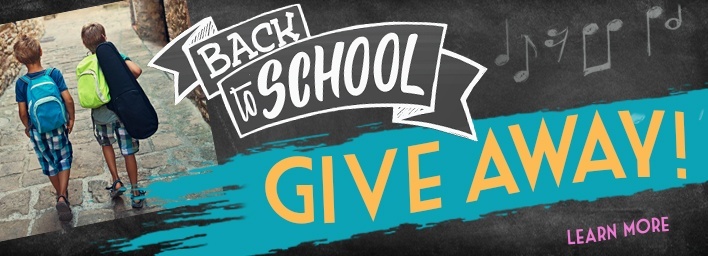How To Create A Fundraising Plan For The School Year?

Are you desperate for a fundraising plan that is actually FUN - and that students are motivated to participate in? Join the music teacher club. The reality is that "Professional Fundraiser" and "Music Teacher" are not always synonymous. And yet, those funds you raise are often the only way school music programs stay afloat.
That's why we're eager to share this simple guide for creating your program's fundraising plan.
The Budget Drives the Fundraising Goals and Plan
Knowing your school's budget, your program's total costs, and the types of goals you'd like to implement, are all essential to successful fundraising. The number you set as the annual "fundraising goal" gives you a shining star, so to speak, serving as the beacon for everyone who participates. Plus, watching the red line creep up on the thermometer - or up the graphic design of a cello's strings - is a compelling means of inspiring others to give.
Is your program's budget up-to-date? If not, that's Step One.
- Step Two: Is there a discrepancy between what your school/district contributes and your bare bones needs? Determine that gap and make it your first fundraising milestone.
- Step Three: Are there new financial needs this year (basic supplies, instrument repair/replacement, new sheet music, etc.)? Add those costs as your next milestone.
- Step Four: Do you have fantasy goals? Performing at Disneyland or Disney World? Taking your crew on the road for a performance tour somewhere else in the country or pursuing other fun field trips? Dream and little and add those costs in for an additional fundraising goal.
Divide and Conquer the Totals Per Student
Big figures can seem scary - especially for families who already live on a tight budget. However, figuring out each of your fundraising milestone goals as a "Per Student" amount is much less daunting. It helps people to see how much is needed for their child to participate and makes it more inspiring for parents, extended family members, and friends to help their student(s) of interest attain their portion of the fundraising.
Keep those "per student" goals present on all communication that comes out from you throughout the year. You can even track these amounts raised on a spreadsheet to share with individuals and their families, so they know where they stand.
Learn, Know, and Uphold the Rules
The last thing you want is to have to cancel or shut down a current fundraising effort because it violates the rules. The National Association for Music Education emphasizes music educators should:
"...be knowledgeable about Board of Education and school policies regarding fundraising and the fiscal and political ramifications of the effort. Note: Schools and districts differ regarding requirements and policies governing how money raised by booster organizations is to be handled, accounted for, and deposited. This is a critical facet of fund-raising that must be understood and adhered to by the music educator and the parents before any fund-raising activity is begun."
Begin Communicating Early & Often
The sooner you begin communicating your goals, the better. Do you write a welcome back letter to parents? If not, it's a great way to set the tone for the year – and to introduce the fundraising goals and plans.
Then, check-in via email, social media, the school (or your program's) website, etc., throughout the year – keeping everyone interested in the overall progress, upcoming fundraising opportunities, etc.
Be as Diverse as Possible in Your Strategizing
All of the parents and students supporting and involved in your program share a love of music. Other than that, odds are their interests are diverse and varied. By taking a similarly diverse and multi-faceted approach in the fundraising opportunities, you'll attract more attention, meet more "target niches" and have a more successful fundraising experience overall.
If you're new to this, start by asking other coaches, teachers and non-profit groups in your area what events or ideas generate the most dollars-per-effort hours. This gives you important insight into what your local population is the most interested in or generous in funding. It also allows you to get a bigger-picture perspective, noticing if there are fundraising opportunities that aren't tapped in your area. By bringing something new to the local arena, you'll generate untapped sources.
Be Grateful
Always write "thank you’s" to any person or organization that contributes money to your cause. Handwritten notes (engage students' efforts here) are ideal, but electronic or computer generated thank you's are better than nothing.
If a local organization was generous, think of ways you can give back to them in their time(s) of need, particularly in terms of student volunteer hours. This acknowledgment of generosity is not only courteous; it keeps your music students in a positive light that paves the way for future fundraising efforts.
For tried-and-true fundraising ideas that work, read our article Ideas For Raising Funds for Your Classroom.


